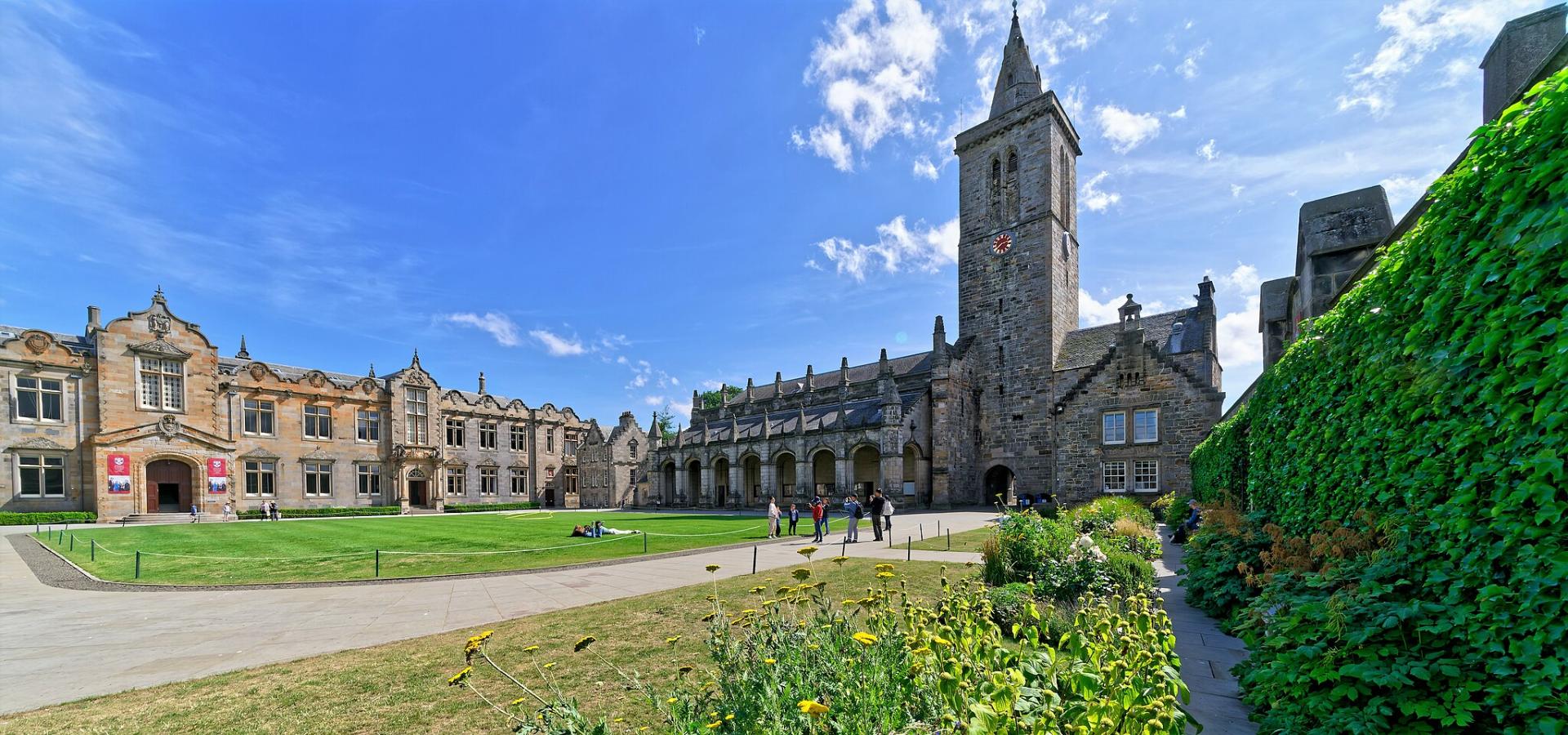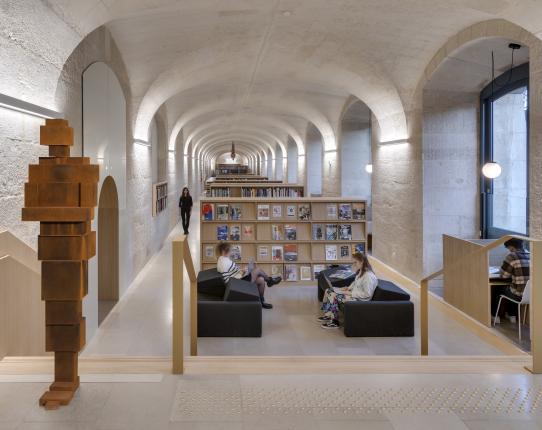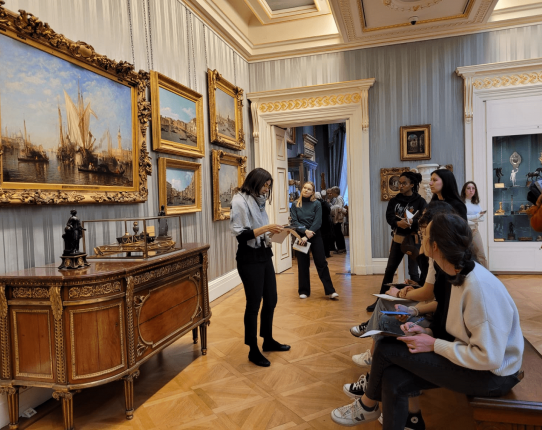
Going abroad
Please note that gap years are not eligible for supervised exchange programs or mobility grants.
Study abroad
The École du Louvre encourages student mobility as part of their studies, whether within or outside Europe, as part of the Erasmus+ program, bilateral agreements or specific programs. Two mobility formats are offered: study stays, with or without a degree, and international seminars.

Where to go?
The mobility map lets you view all the agreements that the École du Louvre has signed with establishments abroad.
Studying in Europe
You can study in Europe as part of the Erasmus+ program, or under bilateral agreements signed between the École du Louvre and other European universities. On your return, you will benefit from the recognition of your stay abroad by obtaining ECTS credits.
The Erasmus+ program (European Region Action Scheme for the Mobility of University Students) enables students to spend 2 to 12 months in another European country participating in the program in order to study at a partner university.
Erasmus+ program policy statement (policy statement) for the Ecole du Louvre 2021-2027
For a list of institutions with which the École du Louvre has signed Erasmus+ agreements, consult the mobility map.
Some European universities (in the UK and Switzerland) are partners of the École du Louvre in bilateral programs, outside the Erasmus+ program.
Mobility must be between 2 and 12 months in L3, M1, M2 and PhD.
The application form (Apply: for a study stay, internship, seminar) is accessible from the digital campus from which several documents will be requested.
NB: at this stage, no language level certificate is required.
Applications are reviewed by the Director of Studies and the International Relations Department. Evaluation criteria include your general level (estimated on the basis of transcripts), your language level and your project presented in the cover letter.
If you are selected for mobility under the Erasmus+ program, you will be awarded the "Erasmus+ studies" scholarship, subject to available funds.
Outgoing mobility
[email protected]
Double European diplomas
The École du Louvre has developed several double degrees at Master and Doctorate levels with leading European universities.
These courses enable students to complete half of their course of study at both institutions, and obtain the degree from each.
This four-semester Master's program combines the complementary skills of the two institutions.
The first two semesters are spent in Paris, and correspond to the museology curriculum (history of collections, principles of conservation-restoration, mediation, heritage administration and management, etc.).
This course includes a dissertation of around 50 pages on an art history or museology topic. Students also have the daily opportunity to discover, analyze and comment on works of art and their presentation at the Louvre and other Parisian museums.
The aim of the two-semester study stay in Heidelberg is to train participants in the methodological foundations of scientific research and to develop their analytical skills and critical sense. Students write a Master's thesis at the University of Heidelberg, for which they will be able to draw on the library's specialized holdings.
Successful participation is formalized:
- at the École du Louvre, by a "Diplôme de muséologie" (after the first year) and a "Diplôme de deuxième cycle" accredited at Master level;
- at the University of Heidelberg by the degree of "Master in European Art History Studies";
- by the award of a certificate from the Franco-German University.
The curriculum is supported by the Franco-German University.
A grant of 3500 euros is allocated to each student in the year of their mobility.
Contact
The Institute of European Art History (IEK) at the University of Heidelberg and the École du Louvre have established a doctoral cooperation agreement enabling postgraduate students from both institutions to benefit from co-supervision by a teacher Habilité à Diriger des Recherches or a curator of heritage teaching at the École du Louvre and by a University professor teaching at the IEK or a Privat-Dozent.
Students admitted are enrolled at both establishments and pay the registration fees at their home institution.
An individual agreement is therefore signed for and by each student and then between the two establishments. Research work lasts for three years.
At the end of this period, students enrolled at both establishments obtain a postgraduate diploma from the EDL and a doctorate certificate for the Faculty of Philosophy.
Contact
The École du Louvre and the University of Leiden (Netherlands) have established a partnership agreement enabling students from both establishments to benefit from co-supervision by a teacher Habilité à Diriger des Recherches or a heritage curator teaching at the École du Louvre and by a professor from Leiden. Enrolled at both institutions, students obtain both degrees, the postgraduate diploma from the École du Louvre and the doctorate from Leiden University.
Contact
The École du Louvre and the Institut d'Histoire de l'art et muséologie de l'Université de Neuchâtel (UNINE) have established a doctoral cooperation agreement enabling postgraduate students from both establishments to benefit from co-supervision by a teacher Habilité à Diriger des Recherches or a heritage curator teaching at the École du Louvre and by a UNINE professor. Enrolled at both institutions, students obtain both diplomas, the École du Louvre postgraduate diploma and the UNINE doctorate.
Contact
Studying outside Europe
You can spend part of your curriculum at a partner university outside Europe, thanks to bilateral agreements signed by the École du Louvre. Upon your return, you will benefit from the recognition of your stay abroad by obtaining ECTS credits.
For a list of institutions with which the École du Louvre has signed Erasmus+ agreements, see the mobility map.
Mobility must be for a period of between 2 and 12 months in L3, M1, M2 and PhD.
The application form (Apply: for a study stay, internship, seminar) is accessible from the digital campus from which several documents will be requested.
NB: at this stage, no language level certificate is required.
Applications are reviewed by the Director of Studies and the International Relations department. Evaluation criteria include your general level (estimated on the basis of transcripts), your language level and your project presented in the cover letter.
Outgoing mobility outside Europe
[email protected]
Seminars and summer schools
The École du Louvre, in partnership with the University Federico II of Naples, is offering a seminar organized between Paris and Naples designed to question the relationship between archaeology and museology.
Introduction
The École du Louvre has joined forces with the University Federico II of Naples to offer a cross-seminar in French, English and Italian bringing together students from each institution. Organized between Paris and Naples, the seminar is based on the complementary nature of specialist talks and field visits, including, in Naples, the Naples Archaeological Museum, the Phlegrean Fields Archaeological Museum, the Herculanense Museum, the sites of Pompei, Velia, Paestum or Rione Terra; in Paris, the national archaeology museum of St-Germain-en Laye, the Musée de l'Homme, the museum of the Bibliothèque nationale de France or Inrap.
The aim of the seminar is to question the relationship between archaeology and museology according to the most recent disciplinary and methodological orientations. The seminar invites participants to reflect on archaeology as a cognitive process, analysis and interpretation, data storage and the digital management of archaeological documents. The seminar also addresses the challenges of conserving, exhibiting and mediating archaeological sites and collections: protecting, exhibiting and understanding the challenges of archaeological sites and museums.
- Target audience: students from the École du Louvre and partner university
- Subject 2023: Reading and transmitting the past: archaeology and museology (download program)
- Subject 2024: To be determined
- Locations: Paris, Naples
- Dates: end of May 2024
Contact
The seminar "Exposing the archaeological object" is organized by the Ecole du Louvre and the Ecole française d'Athènes, in Macedonia (Northern Greece).
The final day of the seminar takes place at the University of Thessalonica and allows students to present an assessment of the seminar and the week's encounters.
Coordination: Laurianne Martinez-Sève, Director of Ancient and Byzantine Studies, Ecole française d'Athènes.
Locations for visits and meetings: Thessaloniki Archaeological Museum; Thessaloniki Byzantine Museum; Vergina (Aigai Museum, Tomb Museum, Veria Museum ...); Serres Museum; Kasta's Tomb and Amphipolis Museum; University of Thessalonica Museum.
- Target audience: Ecole du Louvre students
- Date: May
- Duration: 1 week
- Location: Greece
The École du Louvre is organizing with the MAD Paris (Musée des Arts décoratifs), the Wallace Collection (London), the Victoria & Albert Museum (London) and theUniversité de Lille, a seminar on the history of the decorative arts from the 17th to the 19th centuries.
Introduction
Adjacent to the "Decorative Arts" course of the Master in Art History at the University of Lille directed by Patrick Michel, this seminar benefits from a partnership with two prestigious museum institutions, the Wallace collection (London), and the MAD Paris (Musée des Arts décoratifs). Delivered in English and French, it gives École du Louvre students enrolled in the first year of their second cycle the opportunity to benefit from theoretical instruction as well as practical and technical teaching, as close as possible to the collections and works, with one day at the Musée des Arts Décoratifs and two days in situ and hands on at the Wallace collection.
- Target audience: students from the École du Louvre and partner universities.
- Subject 2023: download the 2023 program
- Dates: March (3 days)
- Locations: Paris, London
Information
The École du Louvre and the Istituto Veneto di Scienze Lettere ed Arti (Venice, Italy) organize an annual joint seminar on particular aspects of Venetian art preserved in the Veneto or in foreign collections.
Introduction
This annual seminar is the fruit of a close collaboration between the École du Louvre and the Istituto Veneto di Scienze, Lettere ed Arti. It is aimed at graduate students from French and foreign universities and schools. It takes place in both French and Italian. A good understanding of both languages is essential.
Each session includes lectures by internationally renowned specialists and illustrative lecture-visits led by curators or professors.
Students' active participation is solicited through monographic presentations of works during the visits. A bibliography and methodological instructions are provided to participants upon registration.
- Target audience: students from the École du Louvre and French and foreign universities and schools
- Topic 2024: Venice and Collecting (download the 2025 poster)
- Languages: French and Italian
- Date: June 26 to July 2, 2025
- Location: Venezia è Laguna
- Application deadline: April 13, 2025
- To apply, please use the following form: Application for the Venetian Art History Seminar 2025.
Contact
Ogni anno, l'École du Louvre e l'Istituto Veneto di Scienze Lettere ed Arti (Venezia, Italia) organizzano un seminario congiunto su aspetti particolari dell'arte veneta conservata in Veneto o in collezioni straniere.
Introduzione
Questo seminario annuale è il risultato di una stretta collaborazione tra l'Ecole du Louvre e l'Istituto Veneto di Scienze, Lettere ed Arti. Si rivolge agli studenti laureati e agli dottorandi delle università (e delle scuole avanzate) francesi, italiane e straniere e giovani curatori professionisti. Si svolge in francese e in italiano. È indispensabile una buona comprensione di entrambe le lingue.
Ogni sessione prevede conferenze di specialisti di fama internazionale e visite illustrative guidate da curatori o professori.
La partecipazione attiva degli studenti è incoraggiata da presentazioni di opere o di temi durante le visite. Una bibliografia e istruzioni metodologiche sono fornite ai partecipanti al momento dell'iscrizione.
- Pubblico interessato : studenti dell'École du Louvre e di università francesi, italiane e straniere (Laurea magistrale e Dottorandi).
- Tema 2025 : Venezia è laguna (scarica il poster 2025)
- Lingue: francese e italiano
- Data: dal 26 giugno al 2 luglio 2025
- Luogo: Venezia
- Termine di iscrizione: 13 aprile 2025
- Per iscriversi, si prega di utilizzare il seguente modulo: Domanda di partecipazione al Seminario di Storia dell'Arte Veneziana 2025.
Contatto
The École du Louvre and the University of Neuchâtel organize a joint seminar on the history of museology every year in Switzerland.
Introduction
Destined for École du Louvre students enrolled in their second year of graduate studies ("Research course in museology") and students at the Swiss University, this seminar takes place every year in Neuchâtel.
Dedicated to the "History of Museology", each session includes lectures, and practical application sessions in local museums.
- Target audience: École du Louvre students
- Subject 2023: Spoliation - Restitution - Provenance research
- Dates: December
Contact
The École du Louvre and the Université de Montréal are offering two museology seminars for students from both institutions in France and Canada
Introduction
The partnership between the École du Louvre and the Université de Montréal aims to offer a Canadian museology seminar, held in Montreal for École du Louvre students, and a French museology seminar, held in Paris for Université de Montréal students.
Canadian museology seminar
Destined for École du Louvre graduate students, this Canadian museology seminar takes place every year in Montreal.
Students take part in the applied research program in museology, run jointly by the University and many of Montreal's heritage institutions.
This seminar is supported by the Office franco-québécois pour la Jeunesse (OFQJ).
- Target audience: École du Louvre students
- Location: Montreal
- Dates: June to August
French Museology Seminar
As a reciprocal of the Canadian Museology Seminar, a program entitled "French Museology" is offered to students of the Université de Montréal and the Université du Québec à Montréal.
The latter benefit from an overview of French museological and heritage characteristics, through a large number of meetings with heritage managers, visits to institutions or departments with museological specificities.
- Target audience: students from partner universities
- Location: Paris
- Dates: October
Contact
Summer school
As part of the exchange program between Peking University and the École du Louvre, French students travel to China for a summer program introducing them to Chinese culture and civilization.
- Target group: École du Louvre students
- Dates: July (3 weeks)
- Location: Beijing, China
Contact
French language assistant programs abroad
Several programs enable you to spend a year abroad teaching French (in universities, high schools, colleges and elementary school).
As part of France Éducation International's program, 1,400 French assistant positions are available each year in 25 countries.
► France Éducation International's Assistants de français à l'étranger program
Each year, the French-American Fulbright Commission offers French bachelor's degree students positions as French language assistants in the United States.
► Fulbright French Assistant Program
Internships abroad
With a view to professionalizing and internationalizing skills, the École du Louvre encourages its students to extend their training with international experience, through organized internships.
There are two ways to find an internship: using the network that the School makes available to you, or going it alone.
-
By yourself: you have the option of sending an unsolicited application, responding to internship offers and consulting dedicated online sites and platforms such as Réseau Pro, ErasmusIntern, EURES. For all questions relating to internship applications with the Ministry of Europe and Foreign Affairs (MEAE), please consult the following page: https://www.diplomatie.gouv.fr/en/emplois-stages-concours/stagiaires-etudiants/
- By the School: committed for several years to a policy of partnerships and collaborations with various European and non-European organizations, the School offers internships within numerous partner institutions, offering students guaranteed places, high-quality scientific supervision, and possibly material benefits.
We encourage you to carry out internships lasting more than one month, and which should not exceed a duration of 6 months.
Internships abroad can be carried out during undergraduate studies (in summer), graduate studies (1ère year: in summer; 2ème year: from January to October), postgraduate studies or as part of a gap year.
It is necessary to check the compatibility of the dates and content of the desired internship with your academic curriculum. In case of doubt, please contact the schooling department.
Europe
- Staatliche Antikensammlungen und Glyptothek, Munich (Germany)
- Sprengel Museum (Germany)
- Exchange program for young museum professionals Office franco-allemand pour la Jeunesse (OFAJ)
- German Center for Art History Deutsches Forum für Kunstgeschichte (DFK Paris)
- Domaine & Musée royal de Mariemont, Morlanwelz (Belgium)
- Musée Mode et Dentelle, Brussels (Belgium)
- Casa Battló, Barcelona (Spain)
- Casa de Velázquez (Spain)
- Ministère de l'Europe et des Affaires étrangères (Worldwide)
- Fondazione Musei Civici di Venezia (Italy)
- Settore Musei di Bologna (Italy)
Outside Europe
- La route des Chefferies(Cameroon)
- French Sculpture Directory, Williamstown (United States)
- American institutions via the French Heritage Society (United States)
- Davis Museum and Wellesley College (United States)
- Maharaja Sawai Man Singh II Museum, Jaipur (India)
A first round of interviews to select candidates takes place during November.
Each application is the subject of an interview with the Director of Studies and the SRI, who are in the best position to judge your real skills and will be able during the interview to redirect your project if necessary according to available offers.
If an internship remains unfilled after this first round of interviews, you will have the opportunity to apply for it during the school year. Internships still vacant will be communicated via the extranet.
You must draw up an internship agreement between the École du Louvre, the foreign host organization and yourself. To apply for an internship agreement, you'll need to fill out an online form on the Extranet of the École (Stages et insertion pro section) at least 4 weeks before the start of the internship.
French legislation on gratification for internships does not apply abroad. Gratification by the host organization abroad is therefore not mandatory.
There are several grants available to finance your international internship (Erasmus+ "internship" grant and Erasmus+ supplement for students with disabilities, international mobility aid, Mobilité Île-de-France grant, etc.). The allocation of these grants depends on a number of criteria, including your country of destination, your profile and the duration of your internship.
You can apply for internship-abroad grants before your departure via an online form from the International Relations department, subject to the eligibility of your file.
Useful links
Contact
Service des Relations internationales
Aile Flore, 2nd floor. Offices F08, F09, F11.
Student reception, in person (no appointment necessary)
- Tuesday : 2:00 pm-5:00 pm
- Thursday : 2:00 pm-5:00 pm
We would also like to remind you that all information is available online. Please feel free to visit our web pages and e-mail us with any questions: [email protected] / [email protected]



